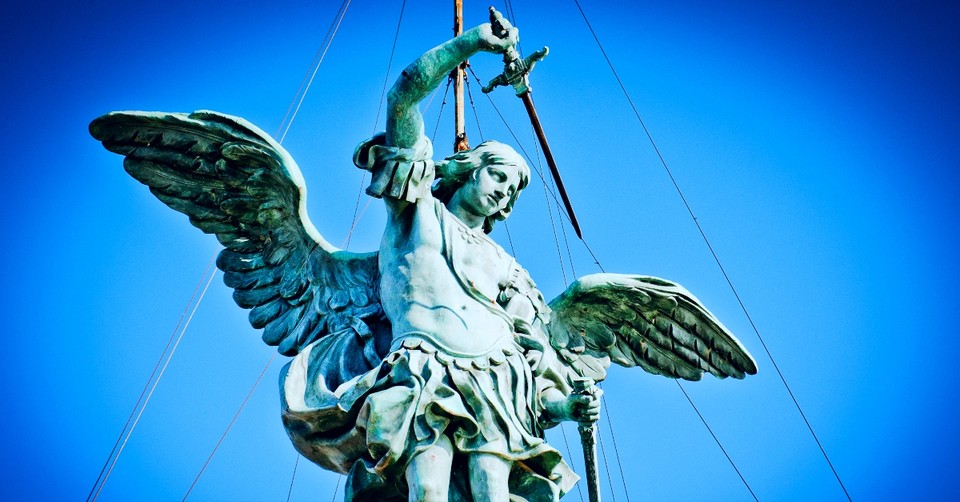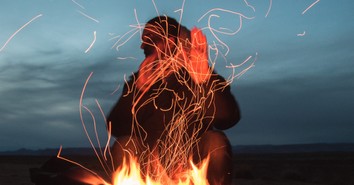Who Is the Archangel Michael?

Michael is known as God’s "Archangel," which means "chief angel." His name means "who is like God," but who is he?
Who is Archangel Michael?
Scripture often refers to Michael as a “chief prince” of the heavenly. The Book of Daniel mentions him multiple times: in Daniel 10:13 as “Michael, one of the chief princes,” and in Daniel 12:1 where “Michael, the great prince,” protects the people of Israel. In Daniel 10:21, “There is no one with me who contends against these princes except Michael, your prince.” He worked with another angel to answer Daniel’s prayer that God would “turn away your anger and your wrath from Jerusalem, your city, your holy hill” (Daniel 9:16). The reference above, from Jude, is one of only a few direct references to Michael.
St Michael the Archangel Prayer
The Prayer to Saint Michael the Archangel is a Catholic prayer seeking the intercession and protection of the Archangel Michael against the forces of evil. It is often recited after Mass in the Catholic Church. Here is the traditional version of the prayer:
"Saint Michael the Archangel,
defend us in battle.
Be our protection against the wickedness
and snares of the devil.
May God rebuke him, we humbly pray;
and do thou, O Prince of the Heavenly Host,
by the power of God, cast into hell
Satan and all the evil spirits
who prowl about the world seeking the ruin of souls. Amen."
This prayer is considered a powerful invocation for spiritual protection and is often used by Catholics in times of difficulty or when facing spiritual battles.
Bible Verses about Archangel Michael
Yet Michael the archangel, when contending with the devil he disputed about the body of Moses, durst not bring against him a railing accusation, but said, The Lord rebuke thee (Jude 1:9 KJV).
And there was war in heaven: Michael and his angels fought against the dragon; and the dragon fought and his angels, And prevailed not; neither was their place found any more in heaven. (Revelation 12:7-8)
For the Lord himself will descend from heaven with a cry of command, with the voice of an archangel, and with the sound of the trumpet of God. And the dead in Christ will rise first. (1 Thessalonians 4:16)
The prince of the kingdom of Persia withstood me twenty-one days, but Michael, one of the chief princes, came to help me, for I was left there with the kings of Persia (Daniel 10:13)
“At that time shall arise Michael, the great prince who has charge of your people. And there shall be a time of trouble, such as never has been since there was a nation till that time. But at that time your people shall be delivered, everyone whose name shall be found written in the book. (Daniel 12:1)
What Does Archangel Michael Look Like?
The Bible does not help us here very much, although artists have imagined the Archangel Michael (and all angels) as beautiful, taller than humans, and powerful. “Angels are spirit beings” with “some type of localized form — they occupy some space [...] adapted to the unseen spiritual realm.”
Paul explains that “not all flesh is alike” and “there are both heavenly bodies and earthly bodies, but the glory of the heavenly is one thing, and that of the earthly is another” (1 Corinthians 15:39-40). Hebrews 13:2 tells us to remember “to show hospitality to strangers, for by so doing some people have shown hospitality to angels without knowing it.”
Therefore, they must sometimes take human form, but that form might not be obvious. A host of angels greeted shepherds, watching their flocks on the night of Christ’s birth; their form was obvious and glorious. At other times, angels blend in with the crowd.
Archangel Michael in the End Times
The Archangel Michael will play a significant part in end-time events. “Michael, the great prince, the protector of your people, shall arise” (Daniel 12:1). He might be the angel of 1 Thessalonians 4:16, of whom Paul writes, “the Lord Himself, with a cry of command, with the archangel's call and with the sound of God's trumpet, will descend from heaven, and the dead in Christ will rise first.” This angel leads a host of angels in a victorious war over Satan and His demons in Revelation 12.
Michael is not merely one of the angels but the head of a battalion of angels, though not their ultimate leader; that would be God. Christ’s apostles would have understood the military hierarchy exemplified by the Roman system, where Caesar was in command, and the senate operated as an “advisory body to Rome's magistrates.” Top military officials were drawn from the senate, consisting of Roman citizens.
In other words, an angelic hierarchy would have made sense to listeners during the time of Christ, which is why artists have often depicted Michael as a warrior (here is an example by Raphael). Michael is portrayed as the “great captain” of angels “and the warrior helping the children of Israel.” He was recognized as the “helper of the church’s armies against the heathen and against the attacks of the Devil,” and “numerous representations of Michael in art reflect his character as a warrior.”
Was Michael the Archangel Actually Christ?
A controversial theory suggests that Michael was the pre-incarnate Christ. He is given the title of “prince” and shown to be a “protector of the people of Israel.” Yet, “the one who protects Israel” is God Himself, says Don Stewart. “My help comes from the LORD” (Psalm 121:2-4). Many people argue that if God protects Israel and Michael protects Israel, they must be one and the same. Moreover, when Christ returns, He will come with “the voice, or cry of command, of the archangel” (1 Thessalonians 4:16).
But, as Stewart points out, Michael is the chief prince of angels. Jesus is never given the title “chief prince” among His many names, which include “King of Kings and Lord of Lords” (Revelation 19:16). Michael is like the “legatus Augusti proparetore” who “commanded an entire province.” He is one of several commanders in the Angelic army. He is not unique. Jesus is the one and only Son of God.
In Matthew 28:18, Jesus tells His disciples, “All authority in heaven and on earth has been given to me.” This cannot be said of the Archangel Michael, who, as Jude tells us, could not rebuke Satan; only God can do that. As one with the Father, Christ can rebuke the Devil also.
The real power is Christ’s authority to forgive sins, demonstrated by His sacrifice, submission to Roman punishment, and His victory over death. Angels accomplish what humans imagined Christ would do — defeat armies — while only Christ could surpass the limits of human imagination and desire by accomplishing victory over what matters most — separation from God because of our sins.
Who is the Archangel Michael to Us?
There really are angels; Scripture points to their existence too often to deny that God made them, and they serve a purpose in God’s kingdom. Angels are “mighty ones” who work for God (Psalm 103:20) using His authority and the power He gave them to fight Satan. We see that in the verses cited above. Wayne Grudem tells us that angels deliver messages, “carry out some of God’s judgments,” act as an “example” to us in their worship of and obedience to God, and “patrol the earth as God’s representatives.” They act on behalf of God’s people as per God’s command.
This should create a sense of wonder that there are angels around us doing God’s will, invisible to humans. Elisha and his servant were surrounded by the force of Syria, and Elisha’s servant was terrified. “Do not be afraid, for those who are with us are more than those who are with them” (2 Kings 6:16). Elisha could see what was invisible to most people: God’s forces at work on behalf of His people. Angels are at work around us, and it is tempting to become more enthralled with these beautiful, mighty creatures than with the Son of God.
Even as he fights Satan during the end times, however, the Archangel Michael will not be as powerful as the Messiah. We see Michael as a sword-carrying warrior against demons, but the blade we are most concerned with as Christians is the sword of the Word, an essential piece of the “full armor of God” (Ephesians 6).
What Does This Mean?
One must not worship anyone other than the Lord for, as John Gilhooly reminds us, “to which of the angels did God ever say, “You are my Son; today I have become your Father”? (Hebrews 1:5). “It is bad doctrine that makes creatures secure by creatures.” The Bible repeatedly “promises the very presence of God by the Spirit through faith. We ought to take comfort in the eternal God and his everlasting arms (Deuteronomy 33:27), not the arms of angels.”
Photo Credit: ©iStock/Getty Images Plus/ShaunJeffers


Originally published January 27, 2020.





